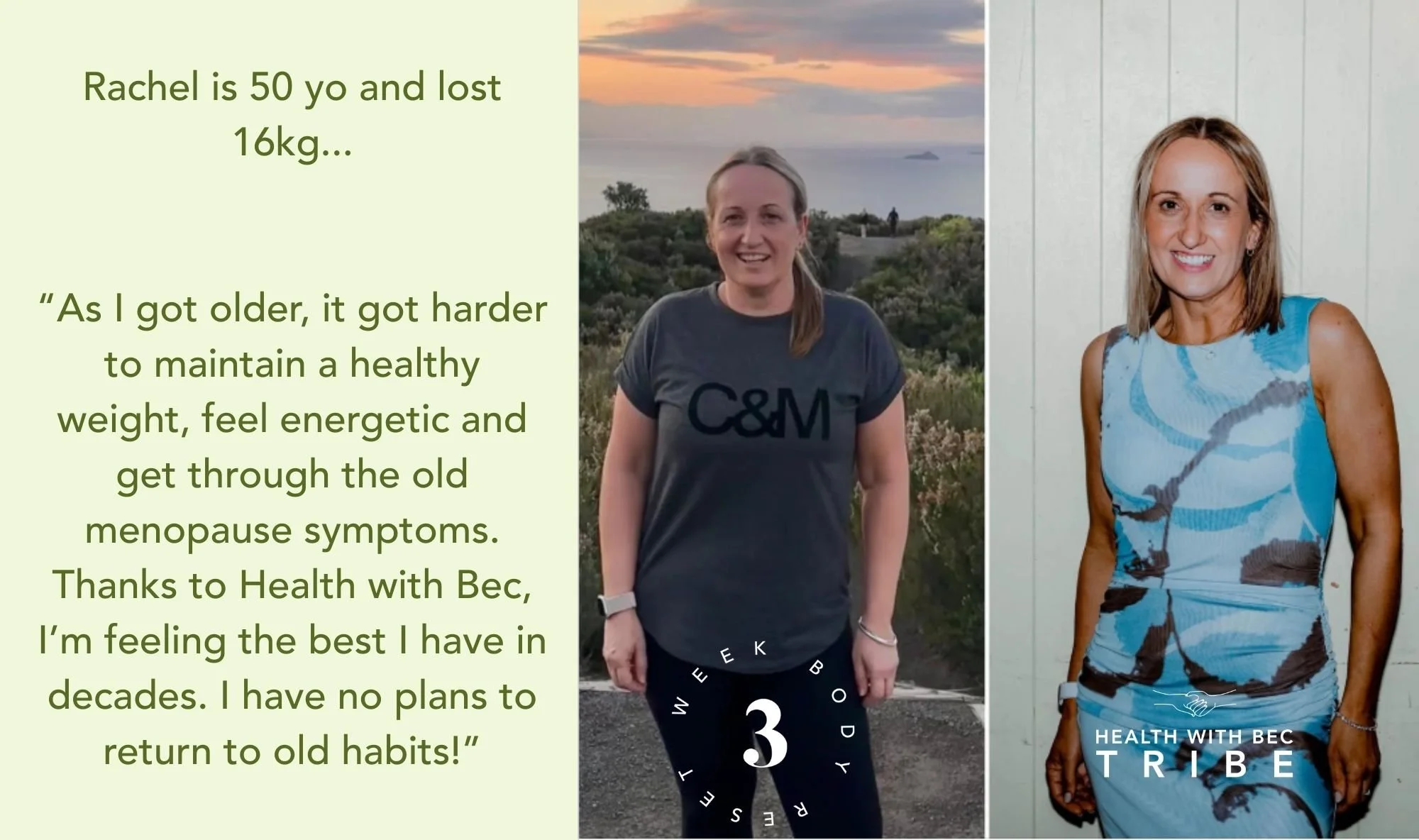Eating for Menopause: Nutrition Tips to Support Weight Loss & Reduce Symptoms
Menopause is a natural stage of life, but it often feels anything but natural.
Between weight gain, hot flushes, restless nights, fatigue, bloating, headaches, brain fog, mastalgia (breast pain), and mood changes, many women feel like their bodies are working against them.
The good news? Following the right diet for menopause can make a huge difference in how you feel during perimenopause, menopause, and postmenopause – and it also protects your long-term health (1).
The Main Health Issues Women Face During Menopause
As women move through perimenopause hormonal changes affect the body in many ways. These shifts don’t just bring a rollercoaster of symptoms, they also increase the risk of certain long-term health issues.
Here are some of the most common challenges women face during this stage of life:
Weight gain
Increase risk of heart disease, osteoporosis, diabetes, and cancer
Muscle and strength loss
Increased inflammation
How the Right Foods Can Support You Through Menopause
Here’s how following the right approach to eating can help you achieve weight balance, feel more energised, and protect your health.
1. Balance blood sugar and prevent weight gain
During menopause, declining oestrogen levels can make weight gain (especially around the belly) more common. Muscle mass also tends to decrease, which slows metabolism. Focusing on whole foods – like fresh vegetables, fruits, lean proteins, nuts, seeds, and healthy fats – helps steady blood sugar and insulin levels, prevent cravings, and reduce visceral fat. This also supports better gut health, energy levels, and mood.
2. Support heart health
Oestrogen has a protective effect on the heart, so declining levels raise the risk of heart disease, but diet plays a powerful role in prevention (2). An anti-inflammatory eating pattern – rich in colourful veggies, fruit, olive oil, nuts, seeds, and fish – lowers inflammation, improves cholesterol levels, and reduces the risk of type 2 diabetes and cardiovascular disease (3).
3. Protect bones and muscles
Bone density declines after menopause leading to a higher risk of osteoporosis and fractures. Which is why calcium and vitamin D become extra important. Aim for foods like dairy or fortified dairy alternatives, leafy greens, salmon with bones, and almonds. At the same time, prioritising protein and spreading it evenly across your meals and snacks helps preserve muscle mass and strength – key for maintaining metabolism and independence as you age. Aim to include around 20 grams of protein at each main meal, plus around 5–10 grams at your snacks to protect muscle and keep you strong.
4. Decrease inflammation
When oestrogen levels drop during menopause, the body can become more prone to inflammation. This doesn’t always show up right away, but over time it may contribute to joint stiffness or pain, ongoing fatigue, and a higher risk of chronic conditions like heart disease, diabetes, and even cognitive decline. Inflammation can also make it harder to manage weight and energy levels. Eating an anti-inflammatory diet rich in vegetables, fruits, olive oil, nuts, and fish, along with regular movement and good sleep, can help keep inflammation in check.
5. Reduce symptoms and feel your best
Certain foods may also help ease menopause symptoms. Soy-based foods (like edamame and tofu) and fish have been shown to ease hot flushes and support mood. At the same time, cutting back on alcohol, added sugars, and highly processed foods can also reduce inflammation and lower your risk of cancer, diabetes, and weight gain.
How My Programs Can Help You Navigate Menopause
Every single one of these nutrition goals for menopause are built into my done-for-you meal plans and programs. I don’t believe in extreme diets or unnecessary restriction – instead, I create simple, balanced meals that are delicious, quick to make, keep you feeling full, and support your health during menopause.
So, if you’re navigating this stage of life and want a meal plan for menopause that actually works, my 3 Week Body Reset and the Health with Bec Tribe are here to help. These programs take the guesswork out of eating and give you a proven plan that makes it easier to stay consistent. So you can manage your symptoms, protect your health, and finally feel good in your body again.
I have already helped tens of thousands of women lose weight, ease symptoms, and improve their health on my programs…
References:
Harak SS, et al. Navigating nutrition through the decades: Tailoring dietary strategies to women's life stages. Nutrition. 2025;135:112736.
El Khoudary SR, et al. Menopause Transition and Cardiovascular Disease Risk: Implications for Timing of Early Prevention: A Scientific Statement From the American Heart Association. Circulation. 2020;142(25):e506-e532.
Barrea L, et al. Mediterranean diet as medical prescription in menopausal women with obesity: a practical guide for nutritionists. Crit Rev Food Sci Nutr. 2021;61(7):1201-1211.




